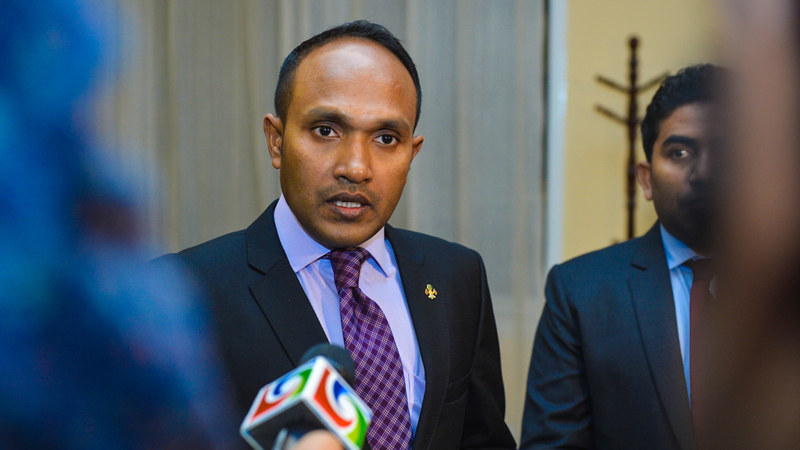President Abdulla Yameen has asked vice president Dr Mohamed Jameel Ahmed to cut short an unauthorised trip to London and return to the Maldives.
A Progressive Party of Maldives (PPM) MP told Minivan News today that the president asked Jameel to return and answer to the ruling party’s parliamentary group over his imminent impeachment.
But president’s office spokesperson Ibrahim Muaz Ali has said that “the president did not in any way ask the vice president to return to the Maldives.”
Naib Raees enburi Raajje vadaigathumah Raeesuljumhooriyyaa evves gothakun edhivadaigenfa eh nuvey.
— Ibrahim Muaz Ali (@SpokespersonMV) June 29, 2015
Muaz was not responding to calls at the time of publication.
Dr Jameel left to Sri Lanka last week after President Yameen authorised a medical leave.
The senior PPM MP said Jameel was due to return two days ago, but instead departed for the UK without informing the president’s office.
“We have tried contacting him repeatedly to ask him to meet with the parliamentary group. But he has not responded. We are trying to bring our problems to him and trying to find a mutual solution,” said the PPM MP.
An anonymous senior government official has meanwhile told Haveeru that Jameel phoned President Yameen yesterday and asked for an extended leave of absence.
However, the president reportedly told his deputy that he could take a holiday after answering to the PPM parliamentary group.
Meanwhile, the parliament today approved changes to its rules of procedure to fast-track the process of impeaching the vice president.
The new rules state the parliament can vote on removing the vice president without an investigation. The rules previously stated that a committee must investigate allegations against the vice president before a vote.
The amendment to the standing orders was passed with 52 votes in favour and 14 against.
Several opposition Jumhooree Party (JP) MPs and Maldivian Democratic Party (MDP) MP Mohamed Nazim voted in favour of the change.
The PPM and coalition partner Maldives Development Alliance (MDA) are preparing to file a no-confidence motion against Jameel this week.
A two-third majority or 57 votes will be needed to remove the vice president. The ruling coalition controls 48 seats in the 85-member house and appears to have secured the opposition’s backing.
Five MPs each from the JP and MDP have signed the no-confidence motion, the PPM has said.
The vice president must be given a 14-day notice ahead of the parliamentary debate on the resolution, according to the constitution.
Pro-government MPs have publicly accused Jameel of incompetence and disloyalty. PPM parliamentary group leader Ahmed Nihan said pro-government MPs are unhappy with Jameel over his alleged failure to defend the government during an opposition mass protest in the capital Malé in May 1.
The ruling coalition is seeking to replace Jameel with tourism minister Ahmed Adeeb.
Some opposition politicians have claimed President Yameen is fatally ill and wants a more loyal deputy ahead of a life-threatening surgery, but Nihan has dismissed rumours over the president’s health.
PPM MP Mohamed Musthafa and MDA MP Mohamed Ismail meanwhile condemned the vice president’s departure on social media yesterday.
Musthafa said that the president did not authorise Jameel’s trip while Ismail said the vice president had “fled” the country.
Ismail said in a Facebook post today that Jameel’s exit lends credence to the allegations against him.
He suggested that Jameel was planning to bring the Maldives into disrepute in interviews with international media outlets.
Last week, the parliament passed the first amendment to the constitution with overwhelming multi-party consensus to lower the age limit for the presidency from 35 to 30 years. Adeeb is now 33.
The opposition’s backing for the constitutional amendment was widely perceived to be part of a deal made in exchange for jailed ex-president Mohamed Nasheed’s transfer to house arrest.
